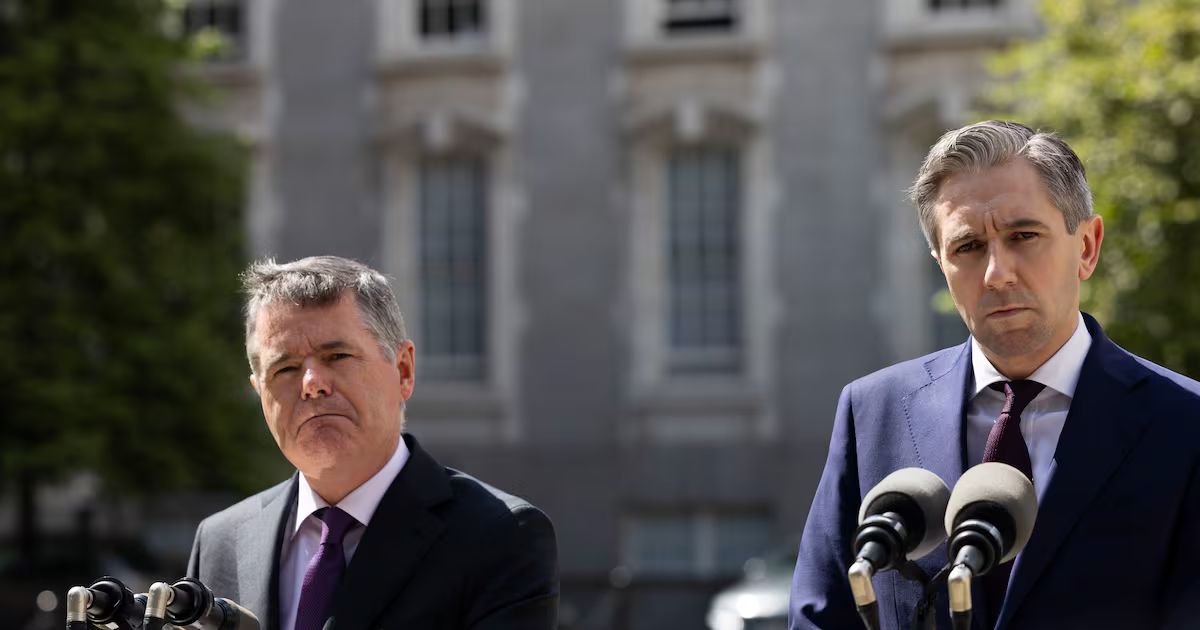Donohoe’s departure is a huge blow to the coherence of the Coalition

That Paschal Donohoe has been tapped for a big international role is not perhaps the greatest surprise Irish politics has seen in recent years.
Head of the Eurogroup – the powerful group of finance ministers from countries that use the common currency – since 2020, Donohoe was tipped for the leadership of the International Monetary Fund in 2024 and was clearly interested, though it did not come to pass.
And while he pledged his future to Fine Gael and Dublin Central ahead of last year’s general election, few expected him to be still around Leinster House after the next election.
However, the news that he is to leave the Government and politics immediately to take up a senior role with the World Bank in Washington still came as a shock on Tuesday morning.
Within the Government there is general acknowledgment – from all sides of the Coalition – that his departure represents a huge blow to the capacity and coherence of the administration.
First, the loss of Donohoe deprives the Coalition of one of its chief problem solvers, someone who was central to the functioning of government and the weekly decision-making that has to be agreed not just by the Cabinet but by the two biggest parties and the Independents, who often have differing perspectives and interests.
Donohoe was essential in maintaining relations with Fianna Fáil especially, and formed a close personal bond first with Michael McGrath and latterly with Jack Chambers.
Paschal Donohoe and Minister for Public Expenditure Jack Chambers. Photograph: Sam Boal/Collins Photos
With each of these two Fianna Fáil ministers, Donohoe formed the central axis of two successive coalitions that was usually a lot stronger than the bond between the two party leaders. With his influence removed, Government business is likely to be more difficult to agree.
Secondly, Donohoe was the main architect of the Government’s fiscal strategy, and while his “Prudent Paschal” persona was not half prudent enough for many if not most economists – who worried about rapid spending growth and the dangerous over-reliance on corporation tax revenues – he was a lot more prudent than any of the other available options.
He was willing to swim against the tide that wanted more spending, lower taxes and an easier political life. His most recent budget, which got rid of the pre-election “one-off” giveaways of the previous three budgets, was evidence both of his clout within the Government and of his flinty determination to pull back at least some of the runaway spending growth.
Third, Donohoe was someone who carried significant credibility with the public. Equal parts dogged and polite in media appearances, his distinctive delivery and sunny personality meant he was one of a handful of politicians known by his first name to the public. Polls showed him among the most highly regarded Ministers.
Unusually in Irish politics, he developed an intellectual framework for his policy approach, writing and speaking frequently about the importance of holding the political centre against challenges from the left and right. Donohoe was always the leader of Fine Gael that Fianna Fáil most feared.
It is expected within the Government that his replacement in the Department of Finance will be his party leader and Tánaiste Simon Harris, creating a vacancy in the Department of Foreign Affairs that may be filled by Helen McEntee.
The Government is likely to announce the mini reshuffle quickly to avoid days of speculation.
The Department of Finance will provide Harris with sway across the operations of government but also require in-depth engagement with the nuts and bolts of policymaking and policy delivery.
Along with the Department of Public Expenditure – and it will be vital for Harris to establish a close working relationship with Chambers – the Department of Finance has an authority and power matched only by the Department of An Taoiseach.
As Tánaiste and party leader, Harris has been involved in budgetary discussions and decisions, but heading the Department of Finance is a bigger ministerial job than he has ever done.
The departure of Donohoe – who is expected to resign as a TD this week – will also necessitate a byelection in Dublin Central, along with the one already required in Galway West after the election of Catherine Connolly as President.
They will probably be held at the last possible moment, which would be the beginning of next summer. It will be hard for the Government to win either seat. Less than a year after Fine Gael and Fianna Fáil were returned to power, the Government is substantially weaker, and its problems are piling up.





